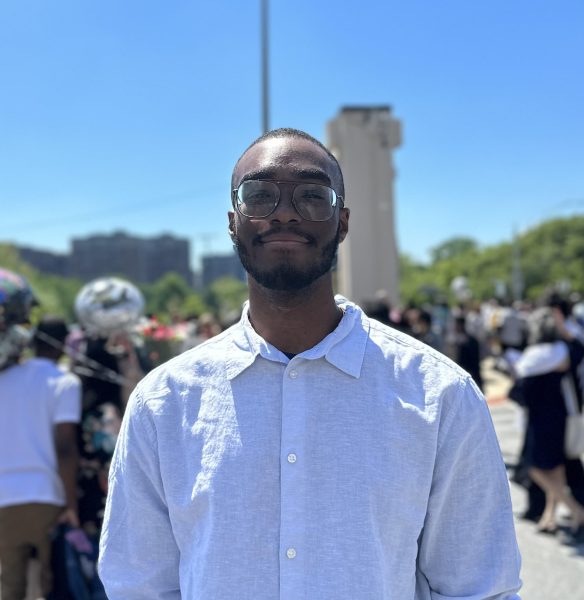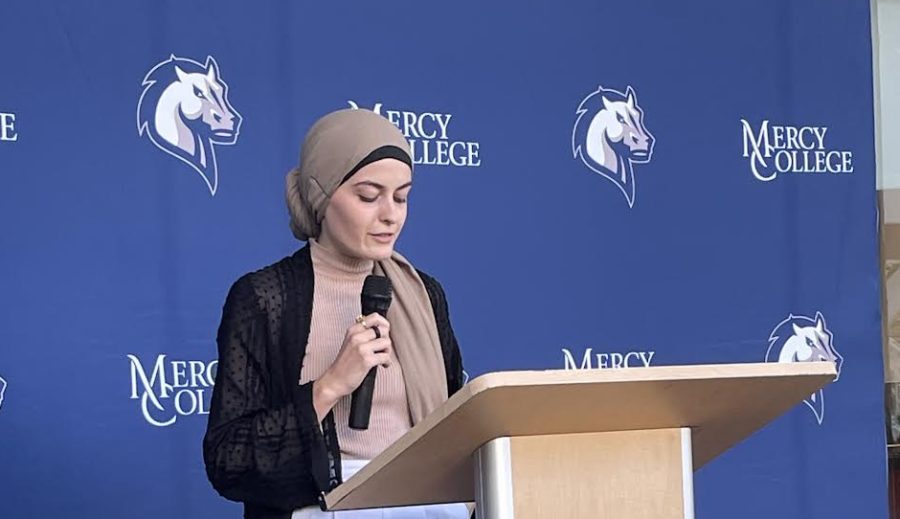Mercy Students Lead Opioid Initiative
“In New York City alone, more people die of drug overdose than homicide, suicides, and car accidents combined. That’s a frightening fact. What are our policy makers doing to help resolve this issue? How are they making treatment more accessible? There needs to be more public pressure.”
This societal dilemma of the opioid epidemic has forced Mercy College students from the Bronx campus to find it in themselves to both help raise awareness about the issue, and fight for more effective solutions.
In early October, Mercy students Davina Resto, member of the Lead for Mercy club, and Anna Engle, Lead for Mercy Community chair, and several other Mercy students, political figures and advocates teamed up to tackle the serious opioid crisis in the nation by holding a three-day program that was held both in-person and through Zoom.
Resto explained that the origins of the initiative comes from when she “partnered with council member Diana Ayala of District 8 on identifying ways we could bring youth awareness and youth lead initiatives to this epidemic and challenge in the Bronx, but particularly the South Bronx.”
This partnership allowed the Lead for Mercy, which is a social and political advocacy club on campus, to have an open and honest conversation about the opioid crisis, while stressing their proximity to the situation.
The students started their initiative on the Mercy College Bronx campus and “wanted to end it in the heart of the South Bronx to symbolize that relationship being built between the two.”
First day of the three-day event was the “South Bronx Initiative Kick-Off Day,” which focused on introducing the community to the purpose of the initiative.
Individuals like epidemiologist and Vice-President of Mercy Bronx Campus, Dr. William Latimer, Council Member Diana Ayala, and Deidre DeLeo of the VSNY: Mobile Crisis Team, gave their professional perspective about the opioid epidemic.
When reflecting on this day, Resto explains that they all talked about the initiative. “We spoke about the importance of raising awareness to such an important challenge within the Bronx community.”
The second day focused on the drug policies in the United States. They discussed how drug policies could impact communities, like the South Bronx.
“We were so honored to have Melissa Moore, who is the New York state director of the Drug Policy Alliance,” said Resto. “An organization dedicated to drug policy reform. Melissa was incredibly insightful and provided us with great information.”
The final day of the opioid intuitive allowed the Lead for Mercy club to talk about the resources available, and made sure that everyone knew that Mercy College will work with the South Bronx community to combat the crisis.
“It was important to end our initiative in the South Bronx and symbolize the relationship we were hoping to build between the school and the community. The work still continues and we are looking for more innovative ways to spread awareness for this important challenge.”
According to a survey conducted by the University of Michigan Substance Abuse Research Center, one in every four college campuses in the United States has a “prevalence of 10 percent or higher for past year non-medical use of prescription opioids.”
Anna Engle, the Lead for Mercy Community chair, also spoke on this fact. Engle explained that this statistic is the reason why their initiative was so important.
“There are several variables in the college setting that may contribute to a student’s usage of opioids. This may be due to one’s age and lack of experience, vulnerability in stressful situations, surroundings that encourage opioid acquisition, increased stress and anxiety that may lead to opioid usage, and a variety of other factors common in the college setting.”
Resto went on to explain that the opioid epidemic is a “complicated public health crisis and it is often, unfortunately, a silent fight. There needs to be more awareness surrounding this challenge and sufficient resources need to be directed towards effective solutions where the goals are to minimize the negative impacts linked to drug use, such as harm reduction.”
When talking about the impact of their opioid initiative, Engle reflected on the event saying that the discussion that took place was an eye-opening moment for many students who did not understand the severity of the situation.
The event has given them the ability to spread information on the crisis and reduced the social stigma around it. Engle also said that she hopes that the Mercy event “has created the foundation for future dialogues and student leaders to bring forth meaningful change in the South Bronx community.”

Maleek Munroe is a senior at Mercy College, majoring in communications. He graduated Nyack High School, where he found his love and passion for both...








